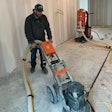The hardwood flooring business used to be so easy. All you had to do was bid, install and bill. Submitting bids that were clear, complete and competitive would get you more jobs. Doing high-quality work on time according to the plans kept customers happy. And when you submitted bills in a timely manner, you always got paid. But what happened?
Now, it sometimes takes 90 days or longer to get paid and maybe even six months or more for the final payment to come through. Clients can run out of money before projects are finished, and construction loans often don't provide enough money to handle every change order, upgrade or unforeseen field conflict. Builders who can't sell or lease completed projects sometimes decide their contractors shouldn't get paid, either.
Collecting money owed to you by customers takes time, organization and effort. You can improve your fast payment record by treating customers firmly yet fairly.
Contractors Are Optimists
As a professional speaker and contractor, I have learned one thing: most contractors and subcontractors are optimists. They often have too much faith in a customer's intentions, word and integrity. They are optimistic about getting paid without proper paperwork and required signatures on contracts and change orders, even though in today's high-tech world, customer requirements for getting paid have become more stringent.
When I ask contractors and subcontractors what their biggest challenge is, they often say, "Getting paid." Yet they often don't stop work or place liens on projects—even when they aren't getting paid—because they don't want to jeopardize relationships with customers. They also continue to do repeat work for these same customers who don't pay promptly.
Train Your Customers
I have learned that you can train your customers. If you are a tough contractor, you get more respect and often get paid faster. If you are soft, you get overlooked and have to wait for your money. Tough contractors never do extra work without signed change orders, and they always place liens on projects when they don't get paid. They usually get paid first, and their change orders get signed before others.
Train your customers by teaching them how you want them to do business. Remember, you are judged by your workmanship, timeliness and price, not your desire to get paid promptly.
Rules for Getting Paid Fast
Here are three simple rules to remember when you want to get paid:
Rule 1: You can collect only if your customer has the money. Always verify that your customer has enough money to pay you. Before starting a project or doing extra work, insist on reviewing the loan documents or calling the banker to verify funding.
Rule 2: You can only collect if you are owed the money. Before doing any extra work, get your customer's approval and signature for it. Never spend time and money on work without the proper approvals.
Rule 3: You can only collect if you bill according to your contract. Experience shows that half of invoices contractors submit are rejected the first time because they were not prepared according to contract terms and requirements. Always invoice on time, use the right billing format and include all of the required lien releases for every supplier and subcontractor.
Checklist for Fast Payment
Getting paid in your timeframe can be as easy as applying the following steps:
1. Always send a preliminary lien notice for every job.
2. Include all the required paperwork, including cost breakdowns and lien releases for every supplier and subcontractor.
3. Never bill for unexecuted or unapproved change orders as part of a progress payment request. Doing so may result in a rejected invoice.
4. Submit separate invoices for change orders that have not been executed, even if they haven't been approved yet. Customers will often pay for small change orders before execution if a separate invoice with a clear and detailed cost breakdown of the work is submitted.
5. Follow up and be persistent. Call or visit the customer at least every 10 days to check on unpaid invoices, and make sure you are talking to the right person.
6. Notify the customer of your intent to stop work and/or file a lien (see "Stake Your Claim" in the August/September 2006 issue of Hardwood Floors) unless paid per the contract. Send or fax your notice as soon as your money is one day overdue. A friendly 10-day written warning will get the customer's attention and, oftentimes, get immediate payment. Also, send a copy of the warning to the project owner or lender.
7. Never give up your lien rights, and always file a lien when you don't get paid per the contract. One of my subcontractors files more than 50 liens per year and says this results in much faster payments. In fact, a proper lien can often help everyone on the project get paid faster.
8. Always file a lawsuit quickly to collect on unpaid invoices and liens. Be prepared to start legal proceedings within 30 days after filing a lien to speed up the collection process. Usually this action encourages the project owner or general contractor to expedite payments.
Get Paid Even Faster
Even if you bill according to the contract, and your customer has the money and executes all the necessary approvals, you may still not get paid as fast as you anticipated. Here are more ways to encourage prompt payment:
Offer discounts. Some subcontractors offer 3 to 7 percent discounts if they are paid in full within 10 days. Because of these discounts, they often get paid before other subcontractors on the job.
Stay current. Never do extra work unless the customer's account is current and paid on time.
Make special deals. Offer customers faster completion or extra work in exchange for better payment terms. Specify no retention, payments every seven days, payments in advance, a 5 percent penalty if not paid within 10 days or payment up front for materials.
Charge interest and late fees. State in all of your contracts that interest and late fees will be added to all invoices more than 30 days overdue. You are in business to make a profit. It is impossible to build a business without getting paid; hard work alone won't keep your doors open. So insist on prompt payment and you will likely remain competitive in today's environment.






























